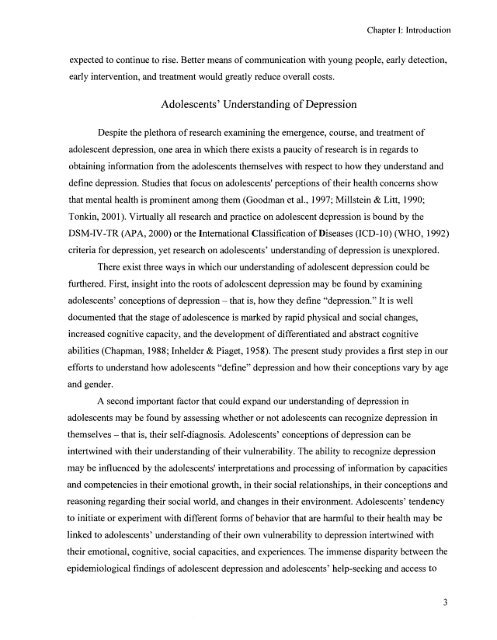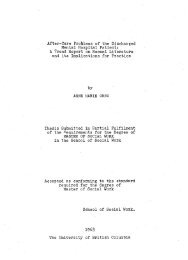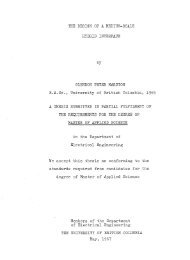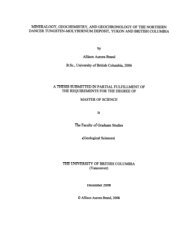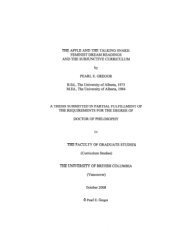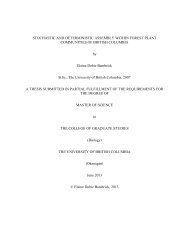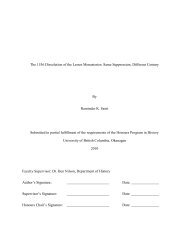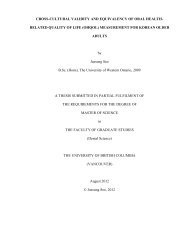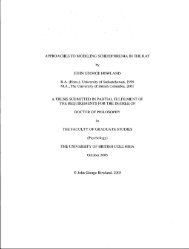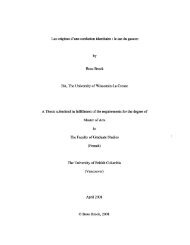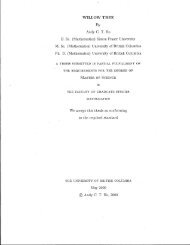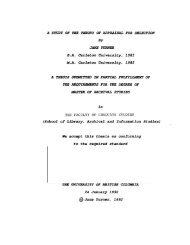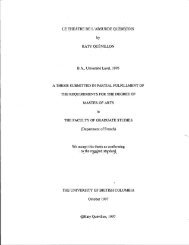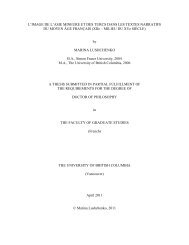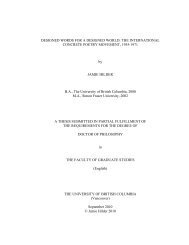how do adolescents define depression? - cIRcle - University of ...
how do adolescents define depression? - cIRcle - University of ...
how do adolescents define depression? - cIRcle - University of ...
You also want an ePaper? Increase the reach of your titles
YUMPU automatically turns print PDFs into web optimized ePapers that Google loves.
Chapter I: Introduction<br />
expected to continue to rise. Better means <strong>of</strong> communication with young people, early detection,<br />
early intervention, and treatment would greatly reduce overall costs.<br />
A<strong>do</strong>lescents' Understanding <strong>of</strong> Depression<br />
Despite the plethora <strong>of</strong> research examining the emergence, course, and treatment <strong>of</strong><br />
a<strong>do</strong>lescent <strong>depression</strong>, one area in which there exists a paucity <strong>of</strong> research is in regards to<br />
obtaining information from the a<strong>do</strong>lescents themselves with respect to <strong>how</strong> they understand and<br />
<strong>define</strong> <strong>depression</strong>. Studies that focus on a<strong>do</strong>lescents' perceptions <strong>of</strong> their health concerns s<strong>how</strong><br />
that mental health is prominent among them (Goodman et al., 1997; Millstein & Litt, 1990;<br />
Tonkin, 2001). Virtually all research and practice on a<strong>do</strong>lescent <strong>depression</strong> is bound by the<br />
DSM-IV-TR (APA, 2000) or the International Classification <strong>of</strong> Diseases (ICD-10) (WHO, 1992)<br />
criteria for <strong>depression</strong>, yet research on a<strong>do</strong>lescents' understanding <strong>of</strong> <strong>depression</strong> is unexplored.<br />
There exist three ways in which our understanding <strong>of</strong> a<strong>do</strong>lescent <strong>depression</strong> could be<br />
furthered. First, insight into the roots <strong>of</strong> a<strong>do</strong>lescent <strong>depression</strong> may be found by examining<br />
a<strong>do</strong>lescents' conceptions <strong>of</strong> <strong>depression</strong> — that is, <strong>how</strong> they <strong>define</strong> "<strong>depression</strong>." It is well<br />
<strong>do</strong>cumented that the stage <strong>of</strong> a<strong>do</strong>lescence is marked by rapid physical and social changes,<br />
increased cognitive capacity, and the development <strong>of</strong> differentiated and abstract cognitive<br />
abilities (Chapman, 1988; Inhelder & Piaget, 1958). The present study provides a first step in our<br />
efforts to understand <strong>how</strong> a<strong>do</strong>lescents "<strong>define</strong>" <strong>depression</strong> and <strong>how</strong> their conceptions vary by age<br />
and gender.<br />
A second important factor that could expand our understanding <strong>of</strong> <strong>depression</strong> in<br />
a<strong>do</strong>lescents may be found by assessing whether or not a<strong>do</strong>lescents can recognize <strong>depression</strong> in<br />
themselves — that is, their self-diagnosis. A<strong>do</strong>lescents' conceptions <strong>of</strong> <strong>depression</strong> can be<br />
intertwined with their understanding <strong>of</strong> their vulnerability. The ability to recognize <strong>depression</strong><br />
may be influenced by the a<strong>do</strong>lescents' interpretations and processing <strong>of</strong> information by capacities<br />
and competencies in their emotional growth, in their social relationships, in their conceptions and<br />
reasoning regarding their social world, and changes in their environment. A<strong>do</strong>lescents' tendency<br />
to initiate or experiment with different forms <strong>of</strong> behavior that are harmful to their health may be<br />
linked to a<strong>do</strong>lescents' understanding <strong>of</strong> their own vulnerability to <strong>depression</strong> intertwined with<br />
their emotional, cognitive, social capacities, and experiences. The immense disparity between the<br />
epidemiological findings <strong>of</strong> a<strong>do</strong>lescent <strong>depression</strong> and a<strong>do</strong>lescents' help-seeking and access to<br />
3


